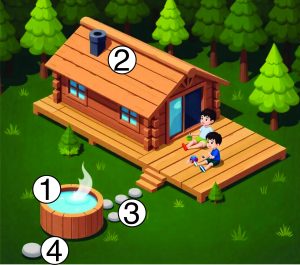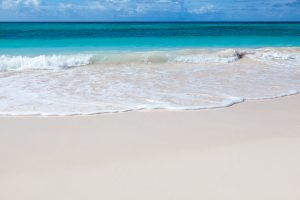21 Lesson 7A
1. Adivinar. ¿Qué es? You are on vacation and staying in a cabin with your little cousin en el campo. He keeps asking questions about all the things around him.
Paso 1. In pairs, alternate being the little cousin and the big cousin and identify all the words in the picture from the word bank.

Modelo:
- Estudiante A: ¿Qué es número 1?
- Estudiante B: Es…
| Word Bank | el sol | el cielo |
| una hamaca | una piscina | un insecto |
| una piedra | un sendero | una cabaña |
Paso 2. What’s missing? Can you identify the words from the word bank that are not shown in the picture but are most likely there?
2. Elegir. Your little cousin keeps asking about things around you. Decide between por and para and answer your cousin’s questions.
Tu primo: ¿Para qué sirve la hamaca?
Tú: La hamaca sirve __________ dormir. (para / por)
Tu primo: ¿Para qué sirve una piscina?
Tú: Una piscina es __________ nadar y refrescarse. (para / por)
Tu primo: ¿Cómo vamos a regresar a la cabaña?
Tú: Vamos a pasar __________ el bosque. (para / por)
3. Entrevistar. Let’s talk about what you like to do on your vacations. In pairs, look at the pictures below and take turns asking and answering questions about your favorite activities while on vacation. Be sure to use the new vocabulary from the word bank and from the 7AB list.
 |
 |
 |
| La playa | Las montañas | El campo |
Modelo:
- ¿Prefieres ir a la playa, las montañas o el campo? ¿Por qué?
- ¿Qué te gusta hacer cuando estás en la playa / las montañas / el campo?
- ¿Con qué frecuencia …(insert verb from the bank below and conjugate it in the present tense)?
| Word bank | hacer surf | nadar | escalar montañas |
| tomar el sol | montar en bicicleta | cazar | pescar |
| acampar | hacer esquí acuático | hacer un picnic | explorar |
4. Escribir. Write about a typical activity or vacation for you and your family using the present tense. Write at least 4 sentences and include at least 3 expressions of frequency from the 6AB Vocabulary list. Once you are done, exchange paragraphs with your partner and improve the story by checking vocabulary, grammar and style. Underline the verbs used.
| Expressions of frequency | siempre | generalmente | a menudo |
| cada día / semana / año | de vez en cuando | todo el tiempo | con frecuencia |
| normalmente | regularmente | todos los días | muchas veces |
Modelo:
Normalmente, mi familia y yo visitamos los parques nacionales. Siempre hacemos un picnic porque los restaurantes cerca de los parques son caros….
5. Mirar. Every October, Jorge and his family like to go to haunted houses. Watch the video describing a past visit and answer the following questions based on what you hear
1. ¿Por qué estaba emocionado Jorge al comienzo de la historia?
a) Porque viajaba a otro país.
b) Porque visitaba una casa embrujada.
c) Porque miraba una película de terror.
2. ¿Qué hacía la madre dentro de la casa embrujada?
a) Gritaba de miedo.
b) Cantaba como artista de ópera.
c) Pasaba por los pasillos.
3. ¿Con quién hablaba el hermano por teléfono?
a) Con su padre.
b) Con su amigo.
c) Con un vampiro.
6. Decidir. What did your instructor used to do? Your instructor will read a sentence aloud about their past habits or activities. If you think the sentence is true, you should move to the left side of the room. If you think a sentence is false you should move to the right side of the room. After reading each sentence your professor will confirm whether it is true or false.
- Cuando era niño/a/e, jugaba fútbol con un equipo.
- En la universidad, estudiaba todas las noches hasta las 3 de la mañana.
- En el verano, viajaba a la playa con mi familia cada agosto..
- Cuando tenía 16 años, tocaba la guitarra en un grupo musical.
- En los veranos, viajaba a otro país con mi familia.
- En mi infancia, visitaba a mis abuelos todos los domingos.
- En la escuela secundaria, me gustaban libros de ciencia ficción.
- Cuando estaba en la escuela, cantaba con el coro.
7. Completar. Complete the following charts with the correct imperfect conjugation.
Cantar
| Yo … | Nosotros … |
| Tú cantabas | Vosotros … |
| Él cantaba | Ellos … |
Hablar
| Yo hablaba | Nosotros … |
| Tú … | Vosotros hablabais |
| Ella… | Ustedes hablaban |
8. Conjugar. Read the following sentences about past trips and childhood activities.
Paso 1. Work with a classmate to select the verb from parentheses that makes more sense and conjugate it in the imperfect (past) tense.
- Cuando era pequeña, mi familia siempre ______________________ (acampar / cantar) en el campo durante el verano.
- Cada día nosotros ______________________ (escalar montañas / nadar) en la piscina pública.
- Mi hermana siempre ______________________ (patinar sobre ruedas / cocinar) cerca de nuestra casa.
- Cada noviembre mis primos ______________________ (estudiar / cazar) en el bosque.
- Mis padres y yo frecuentemente ______________________ (viajar / cocinar) a parques naturales.
- De vez en cuando, tú ______________________ (escalar montañas / hablar) en Colorado.
- Todos los fines de semana, yo ______________________ (limpiar/ tomar el sol) en la playa.
- Después de la escuela, mi mejor amiga ______________________ (montar en bicicleta / limpiar) por el parque.
Paso 2. Study and talk about these imperfect sentences with your partner. Do they refer to actions that were done repeatedly in the past? Are these actions that people used to do or just did once?
9. Jugar. Let’s play ¡Lo Tengo! Walk around and ask your classmates about their childhood pastimes indicated in the chart. Be sure to conjugate the infinitive verbs in the imperfect tú form when you ask a question and the imperfect yo form when you answer. If your classmate answers sí to a question, write their name in the box. See if you can collect names in a horizontal, vertical, or diagonal line. If you can, call out “Lo tengo”!
Modelo:
- Estudiante A: ¿Tocabas el saxófono?
- Estudiante B: Sí. Tocaba el saxófono. (Estudiante A writes the name in the box)
| Tomar una siesta después de la escuela | Patinar sobre hielo en el invierno | Tocar el saxófono | Nadar en la piscina | Bailar ballet |
| Dibujar durante las clases | Patinar sobre ruedas | Viajar con tus abuelo | Acampar en el verano | Montar en bicicleta con amigos |
| Viajar por avión | Celebrar tu cumpleaños con una fiesta grande | LIBRE | Llevar los zapatos “crocs” | Escuchar la música de Ariana Grande |
| Cenar en McDonald’s | Pescar en un lago | Cantar canciones de Navidad | Limpiar la casa con tus padres | Jugar al tenis |
| Mirar el programa “Blue’s Clues” | Explorar cerca de tu casa | Tomar el sol en el verano | Tocar el piano | Desayunar huevos regularmente |
10. Dibujar. You and a partner are going to write and illustrate a very short narration/comic for children.
Paso 1. Pick a main character for your story (it could be an animal or person) and give them a cute or funny name.
Paso 2. Come up with some creative ideas about what your character used to do and divide the ideas into six scenes. Write at least one sentence in Spanish for each scene. Be sure to use the imperfect tense of -ar verbs. Use the new verbs from your 7AB vocabulary list.
Paso 3. Illustrate each accompanying scene using the blank storyboard. Don’t forget to include speech bubbles and a title for your story!
Paso 4. Present your story/comic to another group.
Modelo:
 Este conejo se llamaba Chícharro. Le encantaba sacar fotos de bichos (bugs). Todos los días buscaba insectos en el bosque.
Este conejo se llamaba Chícharro. Le encantaba sacar fotos de bichos (bugs). Todos los días buscaba insectos en el bosque.

